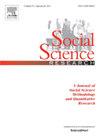独特的黑人名字和歧视机制:来自20世纪初的证据
IF 3.5
2区 社会学
Q1 SOCIOLOGY
引用次数: 0
摘要
在20世纪初的美国,一个听起来特别像非洲裔美国人的名字对受教育程度、职业、收入、婚姻状况和寿命有什么影响?这些影响对不同表型种族/民族的人有何不同?当代研究的结果表明,种族化的名字与负面结果有关,如工作面试、出生结果和教师期望。此外,先前的研究表明,种族特定名称的后果解释了种族间历史死亡率差距的10% (Cook et al., 2016)。我们认为,从理论上讲,在美国历史的早期,名字不应该成为种族歧视的一种机制。通过兄弟姐妹比较设计和相关的行政记录,我们假设在20世纪初的美国几乎没有基于人名的种族歧视。我们发现,与名字听起来不那么像非洲裔美国人的兄弟相比,名字听起来更像非洲裔美国人的男性在教育、工资、职业或寿命方面的表现并不差(或更好);这一发现适用于白人和黑人。这并不意味着20世纪初的美国没有种族歧视。相反,它暗示了这个时代的人们基于名字和这些名字所暗示的种族之外的其他东西进行歧视。本文章由计算机程序翻译,如有差异,请以英文原文为准。
Distinctively black names and mechanisms of discrimination: Evidence from the early 20th century
What were the effects of having a distinctively African American-sounding name on educational attainment, occupation, income, marital status, and longevity in early 20th century America? How did those effects differ for people based on their phenotypical race/ethnicity? The findings of contemporary research have shown racialized names to be related to negative outcomes such as job interview callbacks, birth outcomes, and teacher expectations. Furthermore, previous research has shown that the consequences of race-specific names explain as much as 10% of the historical between-race mortality gap (Cook et al., 2016). Theoretically, we argue, names should have been less of a mechanism for racial discrimination in earlier eras of American history. Using a sibling comparison design and linked administrative records, we hypothesize that there was little racial discrimination based on people's names in early 20th century America. We find that men with more African American-sounding names do no worse (or better) with respect to education, wages, occupation, or longevity than their brothers with less African American-sounding names; this finding holds for white and black men. This does not imply the absence of race-based discrimination in early 20th century America. Instead, it implies that people in this era discriminated based on something other than names and the race implied by those names.
求助全文
通过发布文献求助,成功后即可免费获取论文全文。
去求助
来源期刊

Social Science Research
SOCIOLOGY-
CiteScore
4.30
自引率
4.00%
发文量
0
审稿时长
65 days
期刊介绍:
Social Science Research publishes papers devoted to quantitative social science research and methodology. The journal features articles that illustrate the use of quantitative methods in the empirical solution of substantive problems, and emphasizes those concerned with issues or methods that cut across traditional disciplinary lines. Special attention is given to methods that have been used by only one particular social science discipline, but that may have application to a broader range of areas.
 求助内容:
求助内容: 应助结果提醒方式:
应助结果提醒方式:


